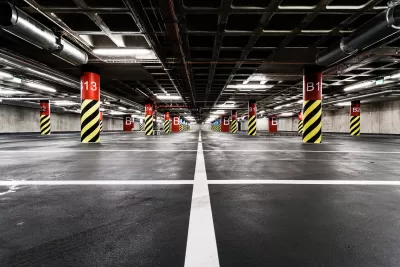A new study shows a significant reduction in housing construction costs in cities that have reduced or eliminated minimum parking requirements.

As more U.S. cities eliminate minimum parking requirements as part of an effort to boost housing supply and affordability, a new white paper from the Rutgers Center for Real Estate assesses the impact of parking reforms on residential development, writes Maddy McCarty in BisNow.
According to the paper, “Any reduction in mandated parking requirements for residential developments will lower initial construction costs and decrease ongoing operating costs, which will effectively allow for the reduction of rents.”
McCarty adds that “The Rutgers study found that if the body governing New Jersey’s parking requirements reduced the standard by just a half-car per unit, average rents in the state should fall by nearly 4%, all else holding equal.”
The article highlights examples from around the country, revealing how much money was saved on specific housing projects thanks to reduced parking requirements. A standalone parking structure costs roughly $28,000 per spot, on average. “In Minneapolis, the cost of new studio apartments, previously averaging $1,200 per month, went down to less than $1K per month in complexes where parking minimums were waived.”
Although parking reform isn’t a one-size-fits-all solution—“parking is driven by the demographic and the needs”—the study shows that letting developers build parking based on demand rather than arbitrary requirements can have a significant impact on construction costs and, in many cases, the number of housing units that get built.
FULL STORY: Over 1,400 Municipalities Have Altered Parking Minimums In Affordable Housing Push. Has It Worked?

Alabama: Trump Terminates Settlements for Black Communities Harmed By Raw Sewage
Trump deemed the landmark civil rights agreement “illegal DEI and environmental justice policy.”

Study: Maui’s Plan to Convert Vacation Rentals to Long-Term Housing Could Cause Nearly $1 Billion Economic Loss
The plan would reduce visitor accommodation by 25% resulting in 1,900 jobs lost.

Why Should We Subsidize Public Transportation?
Many public transit agencies face financial stress due to rising costs, declining fare revenue, and declining subsidies. Transit advocates must provide a strong business case for increasing public transit funding.

Paris Bike Boom Leads to Steep Drop in Air Pollution
The French city’s air quality has improved dramatically in the past 20 years, coinciding with a growth in cycling.

Why Housing Costs More to Build in California Than in Texas
Hard costs like labor and materials combined with ‘soft’ costs such as permitting make building in the San Francisco Bay Area almost three times as costly as in Texas cities.

San Diego County Sees a Rise in Urban Coyotes
San Diego County experiences a rise in urban coyotes, as sightings become prevalent throughout its urban neighbourhoods and surrounding areas.
Urban Design for Planners 1: Software Tools
This six-course series explores essential urban design concepts using open source software and equips planners with the tools they need to participate fully in the urban design process.
Planning for Universal Design
Learn the tools for implementing Universal Design in planning regulations.
Smith Gee Studio
Alamo Area Metropolitan Planning Organization
City of Santa Clarita
Institute for Housing and Urban Development Studies (IHS)
City of Grandview
Harvard GSD Executive Education
Toledo-Lucas County Plan Commissions
Salt Lake City
NYU Wagner Graduate School of Public Service





























